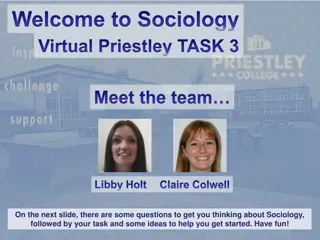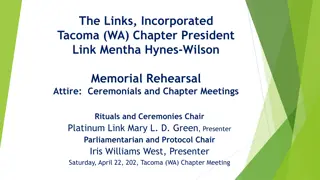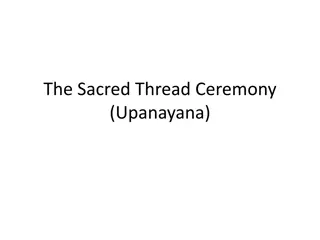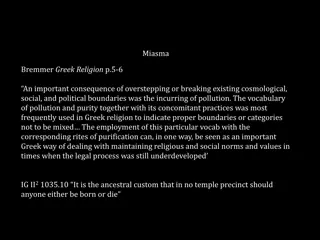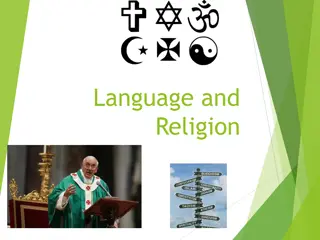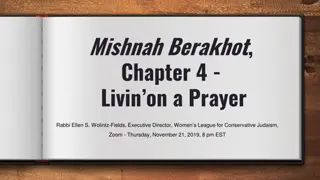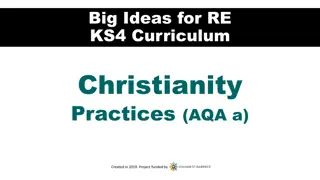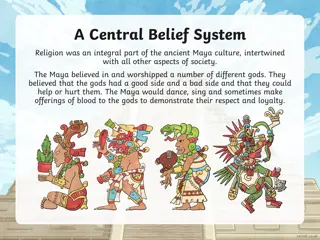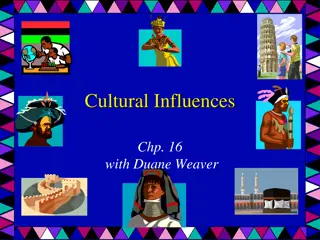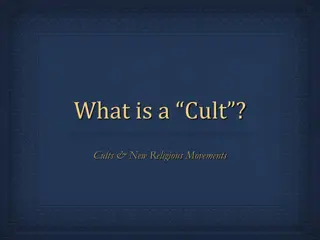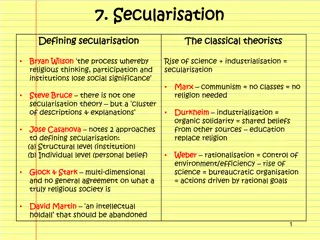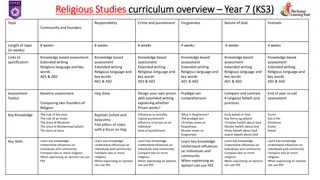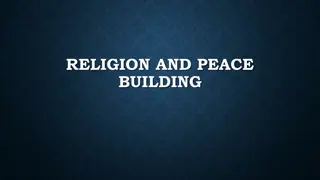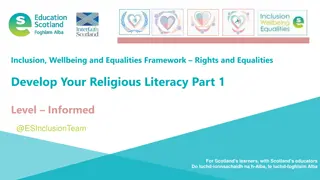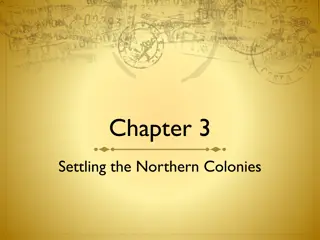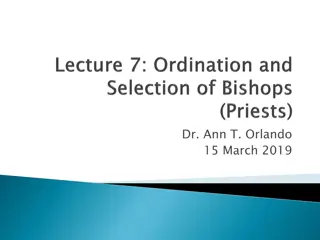Understanding the Rite of Profession for Formation in Religious Orders
The Rite of Profession plays a vital role in the formation process for those entering religious orders, emphasizing the significance of commitment, rituals, sacraments, and essential elements such as questioning, symbols, and assent. It serves as an instructive and affirming experience for individua
0 views • 21 slides
Understanding the Grief Process: Coping with Loss and Grief
Grief is a painful, dynamic, and personal process that occurs when facing a significant loss. It is essential to embrace grief rather than deny or suppress it, as it can have significant effects on the individual. In our culture, there is a tendency to avoid suffering, but it is crucial for those gr
2 views • 23 slides
Status of Family Laws in India: Hindu vs. Religious Minorities
The family and personal status laws in India vary between Hindu law and those pertaining to religious minorities. While Hindu law has seen extensive reforms, discriminatory provisions still exist. In contrast, laws governing religious minorities have undergone fewer reforms, leading to greater inequ
2 views • 4 slides
Understanding Religious Conflict: Definition and Types Explored
Religious conflict is a complex and recurring concept throughout history. Scholars have defined it as disagreements between religious groups. This conflict arises from contentious issues touching on ideology, morality, power, and identity, influenced by various socio-political, economic, and cultura
1 views • 13 slides
Evolution of Akbar's Religious Policy: A Historical Overview
In the 16th century, Akbar the Great implemented a revolutionary religious policy in the Mughal Empire. Initially a devout Sunni Muslim, Akbar evolved his stance to promote harmony and equality among all religions, fostering tolerance and understanding. This shift marked a significant departure from
1 views • 25 slides
Understanding the Shirbit Culture: Beliefs and Rituals
The Shirbit culture holds unique beliefs about the human body, engaging in elaborate rituals to counter its perceived weaknesses and maintain social well-being. This culture's practices include secretive ceremonies, reverence for a charm box, and self-mutilation rituals for both men and women, all b
1 views • 9 slides
The Links, Incorporated Tacoma (WA) Chapter Overview
The Links, Incorporated Tacoma (WA) Chapter is a formal organization focused on friendship and service, with strict adherence to rules outlined in the National Constitution and Bylaws. Members participate in ceremonial rituals wearing specific attire like uninterrupted white. The chapter emphasizes
0 views • 12 slides
Understanding Ramadan: Practices and Customs
Explore the religious practice of Ramadan observed by Muslims worldwide, encompassing fasting, prayer, reflection, and community. Delve into the customs, significance, and celebration rituals of this holy month, fostering self-discipline, empathy, and sacrifice. Compare and contrast cultural/religio
0 views • 11 slides
Elizabethan Religious Settlement: Unity Amidst Division
Amid religious division in England, Queen Elizabeth I implemented a Religious Settlement in 1559 to unify the country. The settlement, a blend of Protestant and Catholic elements, aimed to maintain peace and prevent rebellions. Elizabeth's strategic compromise pleased most people, though lingering t
0 views • 14 slides
Understanding Secularism: Principles and Advantages
Secularism is the principle of separating government institutions from religious entities to ensure equal rights for believers and non-believers. It safeguards freedom of religious belief and practice, upholds religious freedom, and promotes democracy and fairness. Secularism aims to prevent religio
0 views • 21 slides
The Sacred Thread Ceremony (Upanayana) in Hindu Tradition
The Upanayana ceremony, also known as the Sacred Thread Ceremony, is a significant Hindu ritual marking the initiation of young boys into a religious lifestyle. The ceremony involves symbolic acts such as head-shaving, wearing new clothes, and receiving the sacred thread draped over the left shoulde
0 views • 8 slides
Understanding Religious Language: Cognitivism vs. Non-Cognitivism in the University Debate
This discussion explores the debate between cognitivism and non-cognitivism in religious language. Cognitivism asserts that religious claims aim to describe the world and can be true or false, while non-cognitivism argues that such claims express attitudes and cannot be verified. Flew's challenge qu
0 views • 9 slides
Understanding Pollution and Purification in Greek Religion
The concept of pollution and purification played a crucial role in maintaining religious and social norms in ancient Greek society. Breaking boundaries or defying societal expectations could lead to pollution, necessitating purification rituals. Examples of actions that could cause pollution include
0 views • 7 slides
Guide to Using the BSA Calendar of Religious Observances
The BSA Calendar of Religious Observances is a valuable resource for scheduling scouting events in consideration of various religious holidays and observances. This guide provides an overview of the calendar, highlights important dates, and emphasizes the importance of respecting religious diversity
0 views • 8 slides
Celebrating Cultural and Religious Festivals Around the World
Explore the rich traditions and significance of various cultural and religious festivals celebrated globally, from New Year's Day and Christmas to Easter and Valentine's Day. These festivities bring people together in joy, reflection, and camaraderie, encompassing ancient rituals and modern customs
0 views • 12 slides
Understanding the Role of Language in Religion
Exploring the significance of language in religious contexts, this content discusses the functions, features, lexicon, grammar, and metaphorical aspects present in religious language. It delves into how religious language upholds spiritual beliefs, persuades believers, and expresses specific attitud
0 views • 8 slides
Insights from Mishnah Berakhot Chapter 4
Explore the teachings from Mishnah Berakhot Chapter 4 presented by Rabbi Ellen S. Wolintz-Fields, focusing on prayer timings, rituals, and gratitude practices. Reflect on time-bound rituals, structured daily routines, and the significance of prayers in different contexts. Dive into the wisdom of Rab
0 views • 24 slides
Rituals of Atonement in Leviticus 16 Explained
In Leviticus 16, God instructs Moses regarding the rituals of atonement to be carried out by Aaron, highlighting the importance of purity and sacrifice. The chapter details the process involving sin offerings, the selection of goats, the role of Azazel, and the use of incense in the Holy Place. Thes
0 views • 28 slides
Understanding the Cultural Dimensions of Food and Religious Influences in Culinary Arts
Explore the impact of religious beliefs on food traditions and dietary restrictions across different cultures in the culinary world. Learn about the influence of major world religions on eating habits, food choices, and culinary practices. Discover how various religious groups, such as Christians, o
0 views • 26 slides
Exploring Ancient Christian Rituals: Baptism and Eucharist Diversity
Delve into the significance and diverse interpretations of Christian practices such as baptism and the Eucharist, exploring historical contexts, modern observances, and Reformation-era conflicts. Understand the variations in beliefs regarding infant and believers' baptism, different ways of celebrat
0 views • 7 slides
The Vital Role of Religious Institutions in Supporting Immigrants
Religions and immigration are interlinked in modern societies, where religions play a significant role in providing services, defending rights, and supporting the social cohesion of immigrants. Mainstream religious institutions serve as key actors in offering assistance, advocating for migrant right
2 views • 14 slides
Understanding Religious Language: Flew, Hare, Mitchell
Exploring the contrasting views of cognitivism and non-cognitivism in the context of religious language through the perspectives of Flew, Hare, and Mitchell. Delve into Flew's challenge on the undetectable gardener, Hare's concept of bliks, and Mitchell's response to the rationality of religious bel
0 views • 7 slides
Ancient Maya Religion and Rituals
The ancient Maya culture was deeply rooted in religion, with beliefs in multiple gods and the practice of various rituals to appease them. From bloodletting to festivals, priests played a vital role in communicating with the gods and guiding the community. Explore the significance of religious pract
0 views • 5 slides
Understanding Different Types of Rituals: Theoretical Analysis and Cultural Significance
Explore various types of rituals, from secular to religious, and their deeper meanings through symbolic actions and objects. Discover the diverse needs for rituals, including food rituals, warmth, purification, and maintaining order. Delve into the significance of different kinds of rituals like rit
0 views • 23 slides
Understanding Cultural Influences: Norms, Myths, Rituals, and More
Explore the profound impact of culture on society through discussions on norms, myths, rituals, and the sacred versus profane consumption. Learn about cultural variability, shared ethos, and the symbolic significance of myths and rituals in shaping personal conduct and maintaining social order.
0 views • 9 slides
Understanding Cults and New Religious Movements
Explore the concepts of cults and new religious movements, comparing them to traditional religions. Delve into the defining characteristics of cults, sects, and controversial religious movements. Consider starting your own cult by examining teachings, rituals, authority, and organization. Reflect on
0 views • 23 slides
Religious Accommodation in the Army: Advising Command
The content discusses the role of the Chaplain Corps in advising Soldiers and leaders on religious accommodation in the Army as of February 13, 2019. It covers learning objectives, legal foundations, Army policies, procedures, recent changes, and references related to religious accommodation. The in
0 views • 36 slides
Understanding Religious Discrimination Laws in California Workplace
Learn about the regulations and protections under FEHA and Title VII in California, including religious exemptions, accommodation requirements, case studies, and best practices to address discrimination issues effectively. Discover the statistical insights on religious discrimination complaints and
0 views • 45 slides
Understanding Secularisation: The Decline of Religious Influence in Society
Secularisation refers to the process in which religious thinking, participation, and institutions lose their social significance. This phenomenon is influenced by factors such as the rise of science, industrialisation, changing social attitudes, and the disengagement of the church from society. Evid
0 views • 8 slides
Philosophers' Views on Religious Experience: Insights and Critiques
This lesson delves into the perspectives of various philosophers such as Rudolph Otto, Richard Swinburne, John Hick, and Michael Persinger on religious experiences. It explores concepts like the numinous, religious knowledge, God's existence, and criticisms on the validity of religious experiences.
0 views • 7 slides
Philosophers' Views on Religious Experience: Insights from William James
Explore William James' perspective on religious experiences, including his views on existential and value judgments. Understand how James argued for the validity of religious experiences and their potential proof of God's existence. Delve into the implications of emotions and prior beliefs on interp
0 views • 7 slides
Religious and Social Conflicts Fueling the Rise of Absolutism in Europe
Social, economic, and religious conflicts in Europe played a significant role in the emergence of absolutism where monarchs wielded supreme power without sharing it with legislative bodies. Events like Spain's religious conflicts, Protestantism in England, the Spanish Armada, religious conflict in t
0 views • 10 slides
Religious Pluralism and Civil Society: A Paradox in Government Control
Understanding the intricacies of religious pluralism in the context of government control reveals a paradox where restricting religion can hinder social cohesion and economic growth. Through insights on the counterproductivity of control, the role of religious organizations in civil society, and the
0 views • 16 slides
US Religious Freedom Restoration Act (RFRA) Overview
The US Religious Freedom Restoration Act (RFRA) aims to protect the free exercise of religion by ensuring that governments do not substantially burden religious practices without compelling justification. It emphasizes striking a balance between religious liberty and governmental interests through t
0 views • 9 slides
Religious Studies Curriculum Overview for Year 7 and 8 (KS3)
Explore various topics such as responsibility, crime and punishment, forgiveness, nature of God, festivals, community, founders, worship, creation, life after death, rules and laws, relationships in this detailed Year 7 and 8 (KS3) Religious Studies curriculum. The curriculum includes assessments, e
0 views • 6 slides
Religion and Peace Building: Intersections, Impacts, and Practices
Exploring the intersection of religion and peace building, this article delves into how religious teachings, spirituality, and values play a crucial role in promoting peace and reconciliation. It discusses the concept of peace building defined by UN Secretary-General Boutros Boutros-Ghali, the role
0 views • 7 slides
Insights into the Beliefs of the Shang Dynasty
Discover the religious beliefs of the ancient Shang people, including their worship of Shang Di as the supreme deity, the importance of ancestor worship, and the practice of using oracle bones for divination. Explore the tomb of Fu Hao for clues about Shang beliefs and rituals. Engage with images an
0 views • 9 slides
Developing Religious Literacy for Educators in Scotland
This resource aims to enhance educators' understanding of religious literacy by exploring religious discrimination, core beliefs of major faiths, and additional learning sources. It encourages educators to consider the needs of learners in relation to their religious beliefs in Scotland.
0 views • 30 slides
Settling the Northern Colonies: Religious Transformation and Colonization
The Protestant Reformation led to the emergence of Puritanism in the Northern Colonies, with figures like Martin Luther and John Calvin shaping religious beliefs. The Massachusetts Bay Colony stood as a beacon of self-government and religious ideals, while dissenters like Anne Hutchinson and Roger W
0 views • 9 slides
Understanding the Significance of Ordination and Laying on of Hands in Religious Traditions
Exploring the historical and symbolic significance of ordination, selection of bishops, and the laying on of hands in religious ceremonies. From the ancient practices to their relevance in modern times, this content delves into the rituals and meanings behind these sacred traditions.
0 views • 18 slides





